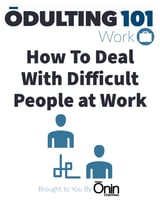At the heart of every successful workplace is effective communication—it’s the secret ingredient...
Handling Conflicts and Difficult Interactions at Work
Conflicts and challenging interactions are almost inevitable in any workplace. They can arise from differences in opinion, miscommunications, or varying work styles. How these conflicts are managed can significantly impact the work environment and overall team dynamics. This blog post will explore strategies for effectively handling conflicts and difficult interactions at work, helping to maintain a harmonious and productive workplace.
Understanding the Nature of Conflicts
Before delving into resolution strategies, it’s important to understand that conflicts aren’t inherently negative. They can be opportunities for growth, improvement, and better understanding among team members.
Strategies for Managing Conflicts
- Stay Calm and Composed: Reacting emotionally can escalate the situation. Take a moment to calm down before addressing the conflict.
- Listen Actively: Often, conflicts arise from misunderstandings. Listen to the other person’s perspective without interrupting. This shows respect and willingness to understand their point of view.
- Communicate Clearly and Respectfully: Express your perspective in a clear and respectful manner. Avoid accusatory language and focus on expressing your feelings and understanding the situation.
- Identify the Root Cause: Look beyond the surface of the conflict to understand the underlying issues. Is it a clash of personalities, a misunderstanding, or a difference in work styles?
- Seek Common Ground: Try to find areas of agreement or common goals that can form the basis for a resolution.
- Use “I” Statements: Frame your statements with “I” to express how you feel or how the situation affects you, rather than placing blame.
- Be Open to Compromise: Sometimes, resolving a conflict requires compromise from both parties. Be open to finding a middle ground.
- Involve a Mediator if Necessary: If the conflict cannot be resolved between the parties involved, consider involving a neutral third party, like a manager or HR representative, to mediate.
- Learn from the Experience: Reflect on the conflict and your handling of it. What can be learned and improved for future interactions?
Dealing with Difficult Interactions
Not all difficult interactions are outright conflicts. Sometimes they involve dealing with challenging personalities or navigating sensitive topics.
- Set Boundaries: It’s important to set and communicate your boundaries, especially if you feel they are being crossed.
- Stay Professional: Regardless of the personal dynamics, maintain professionalism in your interactions.
- Seek Support: If you are consistently facing difficult interactions that affect your work or well-being, it’s advisable to speak to a supervisor or HR for support and guidance.
- Focus on the Work: Redirect conversations to the task or project at hand when interactions become difficult or unproductive.
- Practice Empathy: Sometimes, understanding the other person’s background or pressures can help in managing your interactions with them more effectively.
Conclusion
Effectively managing conflicts and difficult interactions at work is a key skill that contributes to a positive work environment and successful team dynamics. By approaching conflicts with a calm, respectful, and open-minded attitude, you can turn potential problems into opportunities for growth and improved understanding. It’s not about winning an argument; it’s about finding solutions and maintaining healthy working relationships.



